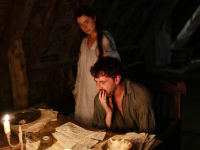Paul Verhoeven’s return to the big screen comes following a decade’s absence. The Dutchman’s familiar works include futuristic romps such as: Robocop, Total Recall and Basic Instinct, all of which truly feel like a memory of the distant past. Whilst the director’s rich sense of satire and irony has been well preserved, Verhoeven’s newest venture is one far more complex and mature.
Elle’s inciting incident takes no time at all to occur. The film opens to the closing moments of Michèle Leblanc (Huppert) being violently sexually assaulted in the dining room of her own home. Bloodied, she picks herself up, though shaken she is not. She proceeds to clear up the mess left in her home before taking a hot bath and heading to bed.
The following day sees her follow her routine as if nothing more normal had occurred. Michèle, austere and prudent in personality, and her job is the real shock here. In contrary to the traditionalist environment of her home, she heads up a development company working on an explicitly violent and sexual video game franchise.
The chaotic nature of Michèle’s life quickly unveils: stirring relationships with her ex-husband Richard (Charles Berling), reluctantly mothering her reckless son Vincent (Jonas Bloquet) and occasionally rejecting the sexual advances of her best friend and business partner’s husband Robert (Christian Berkel). Michèle’s sense of humour becomes only one of the tools in her arsenal of abilities to shrug off life’s challenges, each becoming more surprising.
From the start, Huppert shines as the protagonist. No mean feat for an actress with such revered status, this performance surely ranks amongst her best. As a woman who’s increasingly psychopathic, we learn further that she is simply a victim of her past. Having been exposed to serious atrocities committed by her infamous father, her character could not be more convoluted or unforgiving.
Huppert makes light work of traversing the landscape of the role. Scenes that are particularly brilliant scope from the wildly comic, to the depths of depravity. Huppert allows us to see Michèle’s confidence in her confusion. A woman tarnished by the weather of the world, convinced that she will not officially report her rape (owing to her public treatment by the hands of the police in a past life), she holds her head high as she storms through a minefield of personal conflict.
Whilst littered with laugh out loud comedy spatters, the true relief comes in the form of Michèle’s mother, Irene (Judith Magre). An aging bourgeois socialite, Irene could not serve as a higher embarrassment to her daughter. In between flaunting off her most recent set of Botox injections and her drastically younger lover, her main purpose here serves to be failing miserably in assisting her daughter in managing her life as she pours through the potential sea of men who may have attacked her. In fleeting moments, Elle finds itself absorbed and swamped in it’s own emotional complexity. Whether this should be regarded as a negative is simply a matter of taste.
The film itself remains stylistically spartan. In synergy with its subject matter and leading character, the display executes itself without flourish or grandeur. Whilst sublimely shot and under-pinned by a tightly assembled score, the film draws little attention to its techniques, a rarity in French cinema and even more so from its director.
Whilst recognising it as a striking piece of cinema, its arduous nature and complexities make it hard to find reason for repeat viewing. In dealing with our process of learning about humanity’s capability to deal with a crisis, Elle exceeds. In the vain of Verhoeven’s previous work – making for a light and heady Sunday evening watch – it falls flat… but that was never the intention here.
Author: Joe, York store







